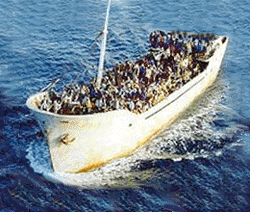...Best of Sicily presents... Best of Sicily Magazine. ... Dedicated to Sicilian art, culture, history, people, places and all things Sicilian. |
by Roberto Paglia | ||
Magazine Index Best of Sicily Arts & Culture Fashion Food & Wine History & Society About Us Travel Faqs Contact Map of Sicily |
The captains who smuggle these illegal immigrants operate a black market trade far riskier than that of the Mexicans crossing into the United States (passengers often perish when the overcrowded boats sink), though in some respects the problem is similar to that confronting the Americans. Italy (even in "poorer" regions such as Sicily) is full of illegal immigrants from outside the European Union who do all the work that Italians --despite high unemployment-- refuse to do. The Africans and Asians seem to prosper in a difficult environment. These "new Sicilians" have established businesses in places long abandoned by Sicilian officialdom as beyond hope. In fact, their calls into question the Sicilian work ethic (if indeed such a thing ever existed among more than a small minority of hardworking Sicilians). Yet trafficking in immigrants is a serious matter, and uncontrolled (and illegal) immigration poses a problem in Italy and across the European Union. The Mediterranean, and Italy's porous coastline, make landings relatively easy. A related problem is the illegal immigration of Tunisians and other north Africans via legal transportation. Italy is frequently criticized for its lax immigration policy. That Sicilians often exploit these immigrants, paying low wages for difficult physical work, is a reflection of the dark side of human nature, especially considering that Sicilians working in northern Italy are themselves often looked down upon as socially inferior. On the other hand, immigrants are increasingly visible working legally in stores and other establishments operated by Italians. Integration is becoming a reality. The waves of immigration into the European Union show no signs of abating. While some of the immigrants (or their children) may occasionally complain about certain aspects of European life --such as the rights of Muslim girls to wear headscarves in France's public schools-- it is clear that in Europe the lives of these immigrants are, in most cases, better than they would have been in their countries of origin. Each nation's immigration situation is different, but in Italy the presence of the immigrants is clearly a matter of choice rather than former colonialism (the United Kingdom and France) or a government 's invitation extended to guest workers (Germany). People have migrated for at least sixty thousand years. The trend will continue. About the Author: Roberto Paglia has written several articles for this publication relating to social topics. | |
Top of Page |
 Hardly a week passes without another landing, or another rescue at sea, often off the island of Lampedusa. In an age when the meaning of the term "refugee" is increasingly complex, they come from various countries in Africa or the Middle East. That they might consider a life in the ailing southern Italian economy an "opportunity" only reflects their desperation, and a reminder to the rest of us of the poverty and oppression which exists in most of the world. Many will be sent back home.
Hardly a week passes without another landing, or another rescue at sea, often off the island of Lampedusa. In an age when the meaning of the term "refugee" is increasingly complex, they come from various countries in Africa or the Middle East. That they might consider a life in the ailing southern Italian economy an "opportunity" only reflects their desperation, and a reminder to the rest of us of the poverty and oppression which exists in most of the world. Many will be sent back home.